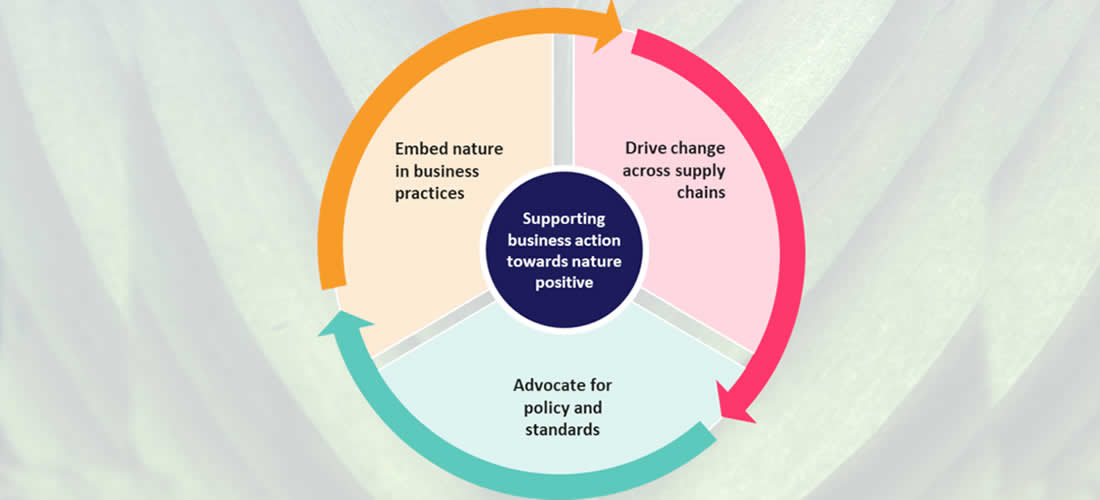Minulý rok se znamenal pro přírodu zlom – ochrana našich lesů, pastvin a oceánů se stala pro firmy po celém světě kritickým obchodním tématem. Jak jsme se přesvědčili na konferenci COP26, příroda je nyní hned vedle změny klimatu.
In fact, a new consensus is emerging – across global and national policymakers, major investors, NGOs and consumers – that our global economy must not just become net zero but also nature positive.
2022 is the year this expectation will be mainstreamed and that puts companies with land and ocean-based value chains at the forefront of action. A staggering 90% of total deforestation is driven by the expansion of agricultural commodities production. Over a third of global fish stocks are now either overfished or depleted, and the majority of the rest are at their limit. For business – especially food retailers and consumer goods companies – protecting and restoring nature is no longer an option; it is a necessity if they want to stay in business.
But becoming nature positive is also an opportunity. Leading food and retail companies have now realized that acting on nature is a chance to win trust with customers and civil society, while mitigating against significant risk exposure and lowering the cost of capital.
That’s because there are trillions of dollars of value at stake. Over half the world’s GDP is dependent on nature, which is why nature risk is fast becoming acknowledged as financial risk by major investors who have pledged to eliminate deforestation from their portfolios by 2025.
Companies in the food system will also miss their net zero targets unless they end deforestation in their supply chains immediately and stop overfishing. Agriculture accounts for nearly a quarter of global greenhouse gas emissions. Marine life absorbs up to 30% of global carbon today, and yet we are destroying this invaluable carbon sink: bottom trawling alone releases as much carbon dioxide as the entire aviation industry.
Equally important for retailers, nature loss has become a major consumer concern. Nine out of ten people in the EU now see biodiversity loss as a serious or very serious issue.
When we speak to CEOs and CFOs, they tell us it’s no longer a question of if they should act, but how.
They want their businesses to be part of the solution. But often, they are overwhelmed by competing demands, and they can’t yet see an effective roadmap for action. They are looking for practical, credible, deliverable approaches relevant to their business models and supply chains.
That’s why our organizations – World Wildlife Fund (WWF) and the World Business Council for Sustainable Development (WBCSD) – are strengthening our collaboration. We’ve both been working on these issues directly with some of the world’s largest companies for decades, and we’re at the forefront of global partner initiatives driving credible business action.
Together, our complementary expertise ranges from governance practices and environmental, social and governance (ESG) disclosures through to procurement processes and supply chain traceability tools. This range of support is what businesses need; because today their investors, customers, and employees all expect them to take comprehensive action to become nature positive.
Thankfully, the road to success is increasingly clear. Food and retail companies that are beginning to thrive through the transition are all doing three things at scale, and so our organizations are joining forces to help them make progress across each of these areas with the latest tools, technologies, and guidance.
First, they’re embedding nature into their business practices. Today, everybody knows that commitments are only worthwhile if they translate into changes on the ground that make credible progress, fast. WBCSD is therefore supporting companies to identify and measure their most material exposures and dependencies, before improving risk management and governance practices to embed nature into every decision.
Second, they’re driving progress within and beyond their supply chains. Unilateral action is no match for the complexities of today’s supply chains. That’s why teams across WWF are helping companies form meaningful partnerships to work together for change, while also outlining guidance for companies to take realistic and credible actions across their own supply chains.
Third, they’re using their influence to visibly advocate for ambitious policies and standards. COP26 demonstrated the importance of multilateral, multi-stakeholder action, and as we approach the UN Biodiversity COP 15, both WWF and WBCSD are working on campaigns with leading businesses to put their voice behind a clear goal for policymakers: protect and conserve a minimum of 30% of global land and 30% global oceans by 2030.
With a clear route to action, and now with access to integrated and comprehensive guidance and support, there is no time for food and retail companies to be complacent. Whatever the size or current level of maturity of your business, get in touch and our teams can offer you practical hands-on support with the tools needed to start halting and reversing deforestation, habitat conversion, and overfishing in your supply chain.
A system shift is underway, and the leading companies of the future will be those who are driving solutions on the ground today.
N.B. The global goal for nature, “nature-positive by 2030” provides a beacon to guide and transform action across all sectors of society, including business. WBCSD’s Nature Positive building blocks provide a framework of what Nature Positive means for business, based on existing frameworks. The steps outlined in the circular diagram demonstrate the areas of focus for WBCSD and WWF as we work to embed nature into business practices and across the supply chain to support companies in demonstrating meaningful progress towards managing performance against natural resource factors.
Zdroj: www.wbcsd.org
 Cs
Cs

